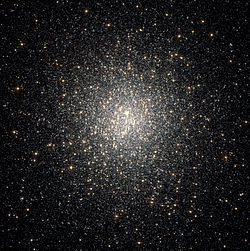
Back NGC 2808 Arabic NGC 2808 AST NGC 2808 Azerbaijani NGC 2808 Byelorussian NGC 2808 BS NGC 2808 Catalan NGC 2808 CE NGC 2808 Czech NGC 2808 German NGC 2808 DIQ
| NGC 2808 | |
|---|---|
 A Hubble Space Telescope (HST) image of NGC 2808 | |
| Observation data (J2000 epoch) | |
| Class | I[1] |
| Constellation | Carina |
| Right ascension | 09h 12m 03.10s[2] |
| Declination | –64° 51′ 48.6″[2] |
| Distance | 31.3 kly (9.6 kpc)[3] |
| Apparent magnitude (V) | 6.2[4] |
| Apparent dimensions (V) | 13.8′[4] |
| Physical characteristics | |
| Mass | 1.42×106[3] M☉ |
| Metallicity | = –1.14[3] dex |
| Estimated age | 10.2 Gyr[5] |
| Other designations | GCl 13, Melotte 95[6] |
NGC 2808 is a globular cluster[6] in the constellation Carina. The cluster currently belongs to the Milky Way, although it was likely stolen from a dwarf galaxy that collided with the Milky Way. NGC 2808 is one of the Milky Way's most massive clusters, containing more than a million stars. It is estimated to be 12.5 billion years old.
The cluster is being disrupted by the galactic tide, trailing a long tidal tail.[7]
- ^ Cite error: The named reference
hcob849_11was invoked but never defined (see the help page). - ^ a b Cite error: The named reference
aj140_6_1830was invoked but never defined (see the help page). - ^ a b c Cite error: The named reference
apj742_1_51was invoked but never defined (see the help page). - ^ a b "Data for NGC 2808". NGC/IC Project. Archived from the original on 15 January 2013. Retrieved 19 November 2013.
- ^ Cite error: The named reference
mnras385_4_1998was invoked but never defined (see the help page). - ^ a b Cite error: The named reference
simbadwas invoked but never defined (see the help page). - ^ Carballo-Bello, Julio A.; Martínez-Delgado, David; Navarrete, Camila; Catelan, Márcio; Muñoz, Ricardo R.; Antoja, Teresa; Sollima, Antonio (2017), "Tails and streams around the Galactic globular clusters NGC 1851, NGC 1904, NGC 2298 and NGC 2808", Monthly Notices of the Royal Astronomical Society, 474: 683–695, arXiv:1710.08927, doi:10.1093/mnras/stx2767
![{\displaystyle {\begin{smallmatrix}\left[{\ce {Fe}}/{\ce {H}}\right]\end{smallmatrix}}}](https://wikimedia.org/api/rest_v1/media/math/render/svg/4c0821bd80891e071c08e7c7ee8e022baedf522c)